希望英语(第二版)综合教程u4
- 格式:ppt
- 大小:873.50 KB
- 文档页数:9
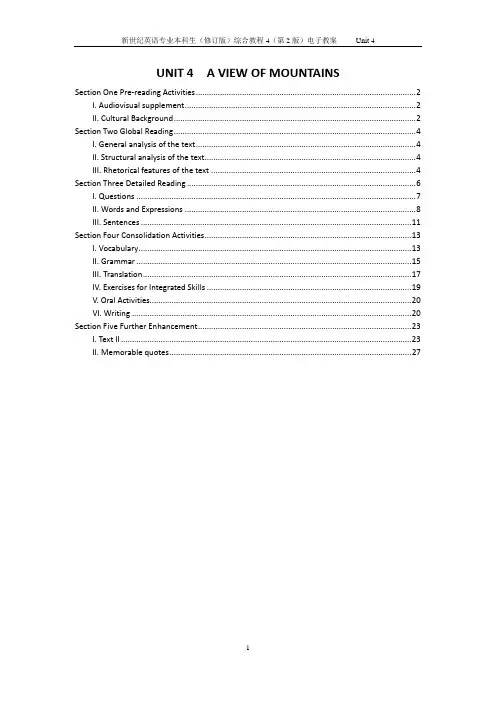
UNIT 4 A VIEW OF MOUNTAINSSection One Pre-reading Activities (2)I. Audiovisual supplement (2)II. Cultural Background (2)Section Two Global Reading (4)I. General analysis of the text (4)II. Structural analysis of the text (4)III. Rhetorical features of the text (4)Section Three Detailed Reading (6)I. Questions (7)II. Words and Expressions (8)III. Sentences (11)Section Four Consolidation Activities (13)I. Vocabulary (13)II. Grammar (15)III. Translation (17)IV. Exercises for Integrated Skills (19)V. Oral Activities (20)VI. Writing (20)Section Five Further Enhancement (23)I. Text II (23)II. Memorable quotes (27)Section One Pre-reading ActivitiesI. Audiovisual supplementFrom On Native SoilWatch the movie clip and answer the following questions.Questions for discussion1.Why did Sally Regenhard say that 9/11 was “a shattering of faith”?Answer: She believed in the system, and now that the system was shattered by the terrorist activity, so she thought the event is faith-shattering.2.Why did Carol Ashley think that there must be an investigation?Answer: 3000 people were killed. And the surviving family members had very right to know the truth about the 9/11. So there needed to be an investigation.3.What do you know about the 9/11 attacks and what influences have the events exert? (Open)Script:Policeman: Move back! Move back!Policeman: Move it! Go back!Eunice Hanson: I knew we had enemies, naturally, but I always felt pretty safe here. I never, never, in a million years dreamed that anything like this could happen to us.Sally Regenhard: We believed in the system and you know, 9/11 was a shattering of faith.Carol Ashley: 3000 people were killed. It was a mass murder. And there needed to be an investigation.Max Cleland: The surviving family members, nobody can deny that they had the ultimate claim to the truth about 9/11.II. Cultural Background1. Atomic BombAtomic bomb or A-bomb is a weapon deriving its explosive force from the release of atomic energy through the fission (splitting) of heavy nuclei.The first atomic bomb was produced at a laboratory in Los Alamos, New Mexico, and successfully tested on July 16, 1945. This was the culmination of a large U.S. army program that was part of the Manhattan Project. It began in 1940, two years after the German scientists Otto Hahn and Fritz Strassman discovered nuclear fission.On Aug. 6, 1945, an atomic bomb was dropped on Hiroshima with an estimated equivalent explosive force of 12,500 tons of TNT, followed three days later by a second, more powerful, bomb on Nagasaki. Both bombs caused widespread death, injury, and destruction, and there is still considerable debate about the need to have used them.2. Nuclear WeaponNuclear weapons are weapons of mass destruction powered by atomic, rather than chemical, processes. Nuclear weapons produce large explosions and hazardous radioactive byproducts bymeans of either nuclear fission or nuclear fusion. After World War II, the proliferation of nuclear weapons became an increasing cause of concern throughout the world. At the end of the 20th century the vast majority of such weapons were held by the United States and the former Soviet Union; other countries that possess known nuclear capabilities are the Great Britain, France, China, Pakistan, and India. Israel also has nuclear weapons but has not confirmed that fact publicly; North Korea has conducted a nuclear test explosion but probably does not have a readily deliverable nuclear weapon; and South Africa formerly had a small arsenal. Over a dozen other countries can, or soon could, make nuclear weapons.3. The Bombing of Hiroshima and NagasakiOn August 6, 1945, the first atomic bomb attack occurred over Hiroshima, Japan. Three days later, on August 9, Nagasaki, Japan was bombed. The bombing of Nagasaki was the last major act of World War II and within days, on August 15, 1945, the Japanese surrendered.In estimating the death toll from the attacks, there are several factors that make it difficult to arrive at reliable figures: inadequacies in the records given the confusion of the times, the many victims who died months or years after the bombing as a result of radiation exposure, and not least, the pressure to either exaggerate or minimize the numbers, depending upon political agenda. That said, it is estimated that by December 1945, as many as 140,000 had died in Hiroshima by the bomb and its associated effects. In Nagasaki, roughly 74,000 people died of the bomb and its aftereffects.In both cities, most of the casualties were civilians. The intentional killing of civilians by the Allies of World War II -who claimed that their cause was just—raised moral questions about the just course of the war.Section Two Global ReadingI. General analysis of the textThrough introducing Yamahata’s pictures, the author aims at bringing to people’s attention what kind of catastrophic consequences nuclear threat may lead to and that the unpredictability of nuclear attack might make any city in the world become the next target. Therefore, the only way to keep this world safe from nuclear peril is for people to take action to dispel nuclear weaponry from the earth.II. Structural analysis of the textThis argumentative essay describes nuclear destruction through a Japanese photographer’s pictures. The text comprises three parts.Part I (Paragraph 1): the writer describes the photographs and how a view of mountains in the background of one picture powerfully captures how thoroughly the city was destroyed by the atomic bomb.Part II (Paragraphs 2 – 3): the author argues that the bombing of Nagasaki is more representative of the nuclear peril threatening the world than that of Hiroshima, because it suggests that nuclear weapons can be used again and threaten everyone, so we need to take action to dispel the nuclear threat from the Earth.Part III (Paragraph 4): he restates his main idea, i.e. we should not just worry about the nuclear peril but take action to eliminate it to create a safer world.III. Rhetorical features of the textIn English, information can be organized in various ways. One of the effective ways of emphasizing some information is to put it after the word but in the “(not) A but B” structure. In the text, the author uses this rhetorical device many times. For instance,The photographs display the fate of a single city, but their meaning is universal ... (Paragraph 2)Practice:Pick out some other sentences with the same structure and analyze the effect they achieve.1) The true measure of the event lies not in what remains but in all that has disappeared. (Paragraph 1)2) … the challenge is not just to apprehend the nuclear peril but to seize a God-given opportunity to dispel it once and for all. (Paragraph 3)3) … one showing not what we would lose through our failure but what we would gain by our success. (Paragraph 3)Apart from the “A but B” sentence structure, we can also find the “A yet B” type:4) Nagasaki has always been in the shadow of Hiroshima ... Yet the bombing of Nagasaki is in certain respects the fitter symbol of the nuclear danger that still hangs over us. (Paragraph 2)5) Yamahata’s pictures afford a glimpse of the end of the world. Yet in our day, ... (Paragraph 3)And we can find a sentence that organizes information in a similar way without the use of the conjunction but or yet:6) Arriving a half-century century late, they are still news. (Paragraph 2)Section Three Detailed ReadingA VIEW OF MOUNTAINSJonathan Schell1.On August 9, 1945, the day the atomic bomb was dropped on Nagasaki, YosukeYamahata, a photographer serving in the Japanese army, was dispatched to the destroyed city. The hundred or so pictures he took the next day constitute the fullest photographic record of nuclear destruction in existence. Hiroshima, destroyed three days earlier, had largely escaped the camera’s lens in the first day after the bombing. It was therefore left to Yamahata to record, methodically -and, as it happens, with a great and simple artistry –the effects on a human population of a nuclear weapon only hours after it had been used.Some of Yamahata’s pictures show corpses charred in the peculiar way in which a nuclear fireball chars its victims. They have been burned by light –technically speaking, by the “thermal pulse”-and their bodies are often branded with the patterns of their clothes, whose colors absorb light in different degrees. One photograph shows a horse twisted under the cart it had been pulling. Another shows a heap of something that once had beena human being hanging over a ledge into a ditch. A third shows a girl who has somehowsurvived unwounded standing in the open mouth of a bomb shelter and smiling an unearthly smile, shocking us with the sight of ordinary life, which otherwise seems to have been left behind for good in the scenes we are witnessing. Stretching into the distance on all sides are fields of rubble dotted with fires, and, in the background, a view of mountains.We can see the mountains because the city is gone. That absence, even more than wreckage, contains the heart of the matter. The true measure of the event lies not in what remains but in all that has disappeared.2.It took a few seconds for the United States to destroy Nagasaki with the world’s secondatomic bomb, but it took fifty years for Yamahata’s pictures of the event to make the journey back from Nagasaki to the United States. They were shown for the first time in this country in 1995, at the International Center for Photography in New York. Arriving a half-century late, they are still news. The photographs display the fate of a single city, but their meaning is universal, since, in our age of nuclear arms, what happened to Nagasaki can, in a flash, happen to any city in the world. In the photographs, Nagasaki comes into its own. Nagasaki has always been in the shadow of Hiroshima, as if the human imagination had stumbled to exhaustion in the wreckage of the first ruined city without reaching even the outskirts of the second. Yet the bombing of Nagasaki is in certain respects the fitter symbol of the nuclear danger that still hangs over us. It is proof that, having once used nuclear weapons, we can use them again. It introduces the idea of a series -the series that, with tens of thousands of nuclear weapons remaining in existence, continues to threaten everyone. (The unpredictable, open-ended character of the series is suggested by the fact that the second bomb originally was to be dropped on the city of Kokura, which was spared Nagasaki’s fate only because bad weather protected it from view.) Each picture therefore seemed not so much an image of something that happened a half-century ago asa window cut into the wall of the photography center showing what soon could easilyhappen to New York. Wherever the exhibit might travel, moreover, the view of threatenedfuture from these “windows” would be roughly accurate, since, although every intact city is different from every other, all cities that suffer nuclear destruction will look much the same.3.Yamahata’s pictures afford a glimpse of the end of the world. Yet in our day, when thechallenge is not just to apprehend the nuclear peril but to seize a God-given opportunity to dispel it once and for all, we seem to need, in addition, some other picture to counterpoise against ruined Nagasaki -one showing not what we would lose through our failure but what we would gain by our success. What might that picture be, though? How do you show the opposite of the end of the world? Should it be Nagasaki, intact and alive, before the bomb was dropped -or perhaps the spared city of Kokura? Should it be a child, or a mother and child, or perhaps the Earth itself? None seems adequate, for how can we givea definite form to that which can assume infinite forms, namely, the lives of all humanbeings, now and in the future? Imagination, faced with either the end of the world or its continuation, must remain incomplete. Only action can satisfy.4.Once, the arrival in the world of new generations took care of itself. Now, they can comeinto existence only if, through an act of faith and collective will, we ensure their right to exist. Performing that act is the greatest of the responsibilities of the generations now alive.The gift of time is the gift of life, forever, if we know how to receive it.I. Questions1. Why is a view of mountains provided by a picture so significant that it was chosen as the title of the essay? (Paragraph 1)Answer: A view of mountains in the distance rather than the wreckage is meant to remind the viewer of the city that was leveled to the ground by the atomic bomb and of the normal life that would have been going on there. This is where the significance of the picture lies.2. Why are Yamahata’s pictures still news? (Paragraph 2)Answer: Because it was the first time that Americans had ever seen the pictures since the atomic bombing fifty years ago.3. In what way(s) is the bombing of Nagasaki the fitter symbol of the nuclear danger? (Paragraph 2)Answer: The bombing of Nagasaki is regarded as the fitter symbol of the nuclear peril in two respects. First, it is evidence that nuclear weapons can be used again to destroy human civilization. Second, the fact that Nagasaki had not been the originally chosen target of the nuclear attack shows the unpredictability of possible nuclear attacks in the future. That is, every city in the world is liable to nuclear destruction.4. What is the universal meaning of Yamahata’s photos? (Paragraph 3)Answer: They were intended to demonstrate the devastating power of nuclear weapons and express an apprehension of the nuclear peril menacing the world.5. Do Yamahata’s pictures fully express the author’s intention of writing? Why or why not? (Paragraph 3)Answer: No, it only expresses part of it, because the writer intends not only to express his apprehension of the nuclear threat but, more importantly, to call on the people to take actions to banish forever nuclear weaponry from the Earth.II. Words and ExpressionsParagraph 1dispatch: v.send sb. / sth. somewhere, especially for a special purposee.g.Even the air force was mobilized to dispatch relief to the quake-stricken area.The government was preparing to dispatch 4,000 soldiers to search the island.constitute: v.a. [linking verb, not in progressive] be considered to be sth.e.g.Failing to complete the work constitutes a breach of the employment contract.Nitrogen constitutes 78% of the earth’s atmosphere.b. if several people or things constitute sth., they are the parts that form ite.g.We must redefine what constitutes a family.It is up to the teacher to decide what constitutes satisfactory work.Practice: Translate the following sentence into English.西海角省(Western Cape)的大部分居民是有色人种。
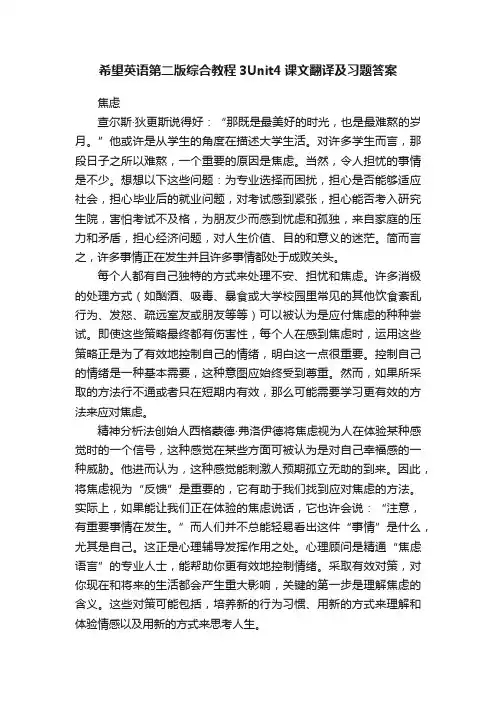
希望英语第二版综合教程3Unit4课文翻译及习题答案焦虑查尔斯·狄更斯说得好:“那既是最美好的时光,也是最难熬的岁月。
”他或许是从学生的角度在描述大学生活。
对许多学生而言,那段日子之所以难熬,一个重要的原因是焦虑。
当然,令人担忧的事情是不少。
想想以下这些问题:为专业选择而困扰,担心是否能够适应社会,担心毕业后的就业问题,对考试感到紧张,担心能否考入研究生院,害怕考试不及格,为朋友少而感到忧虑和孤独,来自家庭的压力和矛盾,担心经济问题,对人生价值、目的和意义的迷茫。
简而言之,许多事情正在发生并且许多事情都处于成败关头。
每个人都有自己独特的方式来处理不安、担忧和焦虑。
许多消极的处理方式(如酗酒、吸毒、暴食或大学校园里常见的其他饮食紊乱行为、发怒、疏远室友或朋友等等)可以被认为是应付焦虑的种种尝试。
即使这些策略最终都有伤害性,每个人在感到焦虑时,运用这些策略正是为了有效地控制自己的情绪,明白这一点很重要。
控制自己的情绪是一种基本需要,这种意图应始终受到尊重。
然而,如果所采取的方法行不通或者只在短期内有效,那么可能需要学习更有效的方法来应对焦虑。
精神分析法创始人西格蒙德·弗洛伊德将焦虑视为人在体验某种感觉时的一个信号,这种感觉在某些方面可被认为是对自己幸福感的一种威胁。
他进而认为,这种感觉能刺激人预期孤立无助的到来。
因此,将焦虑视为“反馈”是重要的,它有助于我们找到应对焦虑的方法。
实际上,如果能让我们正在体验的焦虑说话,它也许会说:“注意,有重要事情在发生。
”而人们并不总能轻易看出这件“事情”是什么,尤其是自己。
这正是心理辅导发挥作用之处。
心理顾问是精通“焦虑语言”的专业人士,能帮助你更有效地控制情绪。
采取有效对策,对你现在和将来的生活都会产生重大影响,关键的第一步是理解焦虑的含义。
这些对策可能包括,培养新的行为习惯、用新的方式来理解和体验情感以及用新的方式来思考人生。
对一些学生而言,焦虑的感觉有时是如此强烈以致于他们会陷入恐慌,无法恰当地应付日常生活中的各种事情。
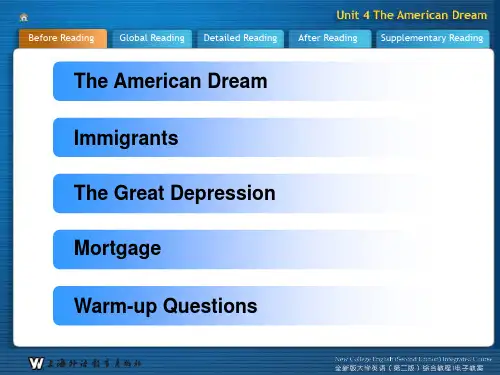

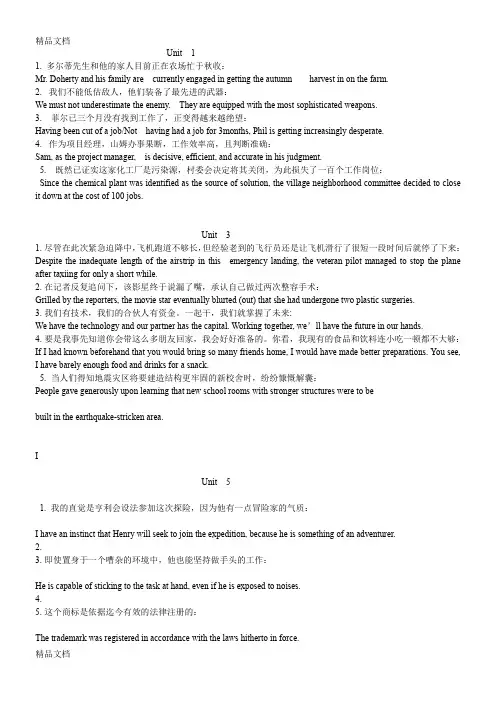
Unit 11. 多尔蒂先生和他的家人目前正在农场忙于秋收:Mr. Doherty and his family are currently engaged in getting the autumn harvest in on the farm.2.我们不能低估敌人,他们装备了最先进的武器:We must not underestimate the enemy. They are equipped with the most sophisticated weapons.3. 菲尔已三个月没有找到工作了,正变得越来越绝望:Having been cut of a job/Not having had a job for 3months, Phil is getting increasingly desperate.4.作为项目经理,山姆办事果断,工作效率高,且判断准确:Sam, as the project manager, is decisive, efficient, and accurate in his judgment.5. 既然已证实这家化工厂是污染源,村委会决定将其关闭,为此损失了一百个工作岗位:Since the chemical plant was identified as the source of solution, the village neighborhood committee decided to close it down at the cost of 100 jobs.Unit 31.尽管在此次紧急迫降中,飞机跑道不够长,但经验老到的飞行员还是让飞机滑行了很短一段时间后就停了下来:Despite the inadequate length of the airstrip in this emergency landing, the veteran pilot managed to stop the plane after taxiing for only a short while.2.在记者反复追问下,该影星终于说漏了嘴,承认自己做过两次整容手术:Grilled by the reporters, the movie star eventually blurted (out) that she had undergone two plastic surgeries.3.我们有技术,我们的合伙人有资金。
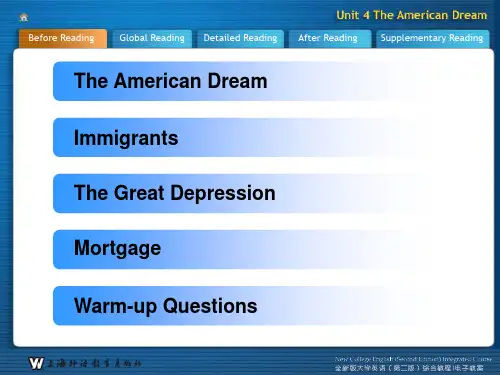

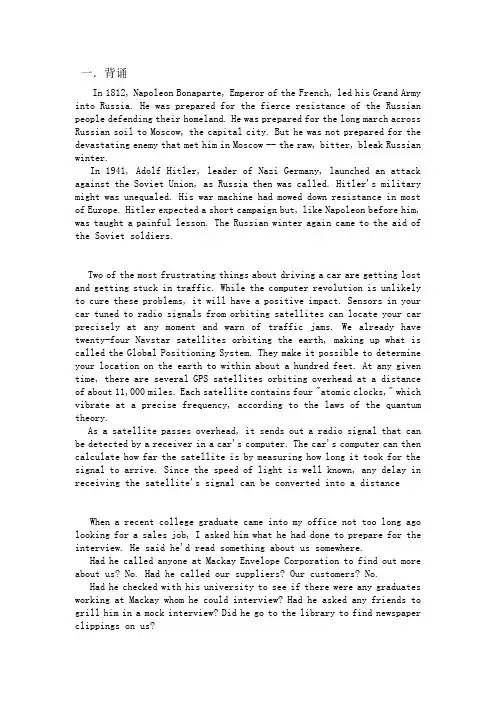
一.背诵In 1812, Napoleon Bonaparte, Emperor of the French, led his Grand Army into Russia. He was prepared for the fierce resistance of the Russian people defending their homeland. He was prepared for the long march across Russian soil to Moscow, the capital city. But he was not prepared for the devastating enemy that met him in Moscow -- the raw, bitter, bleak Russian winter.In 1941, Adolf Hitler, leader of Nazi Germany, launched an attack against the Soviet Union, as Russia then was called. Hitler's military might was unequaled. His war machine had mowed down resistance in most of Europe. Hitler expected a short campaign but, like Napoleon before him, was taught a painful lesson. The Russian winter again came to the aid of the Soviet soldiers.Two of the most frustrating things about driving a car are getting lost and getting stuck in traffic. While the computer revolution is unlikely to cure these problems, it will have a positive impact. Sensors in your car tuned to radio signals from orbiting satellites can locate your car precisely at any moment and warn of traffic jams. We already have twenty-four Navstar satellites orbiting the earth, making up what is called the Global Positioning System. They make it possible to determine your location on the earth to within about a hundred feet. At any given time, there are several GPS satellites orbiting overhead at a distance of about 11,000 miles. Each satellite contains four "atomic clocks," which vibrate at a precise frequency, according to the laws of the quantum theory.As a satellite passes overhead, it sends out a radio signal that can be detected by a receiver in a car's computer. The car's computer can then calculate how far the satellite is by measuring how long it took for the signal to arrive. Since the speed of light is well known, any delay in receiving the satellite's signal can be converted into a distanceWhen a recent college graduate came into my office not too long ago looking for a sales job, I asked him what he had done to prepare for the interview. He said he'd read something about us somewhere.Had he called anyone at Mackay Envelope Corporation to find out more about us? No. Had he called our suppliers? Our customers? No.Had he checked with his university to see if there were any graduates working at Mackay whom he could interview? Had he asked any friends to grill him in a mock interview? Did he go to the library to find newspaper clippings on us?Did he write a letter beforehand to tell us about himself, what he was doing to prepare for the interview and why he'd be right for the job? Was he planning to follow up the interview with another letter indicating his eagerness to join us? Would the letter be in our hands within 24 hours of the meeting, possibly even hand-delivered?The answer to every question was the same: no. That left me with only one other question: How well prepared would this person be if he were to call on a prospective customer for us? I already knew the answer.Although Browder and Mandl define their nationality differently, bo th see their identity as a matter of personal choice,not an accident of birth. And not incidentally, both are DavosMen, members of the interna tional business élite who trek eachyear to the Swiss Alpine town for th e annual meeting of theWorld Economic Forum, founded in 1971. This week, Browder andMandl will join more than 2,200 executives, politicians, academics, jou rnalists, writers and a handful of Hollywood stars forfive days of netw orking, parties and endless earnest discussions about everything from p ost-election Iraq and HIV in Africa to the global supply of oil and the implications of nanotechnology. Yet this year, perhaps more than ever, a hot topic at Davos is Davos itself. Whatever their considerable diffe rences,most Davos Men and Women share at least one belief:that globalization, the unimpeded flows of capital, labor and technologyacross national borders, is both welcome and unstoppable. Theysee the world increasingly as one vast, interconnected marketplace in w hich corporations search for the most advantageous locations to buy, pr oduce and sell their goods andservices.For thirty years now I have been studying my fellowmen. I do not know very much about them. I shrug my shoulders when people tell me that their first impressions of a person are always right. I think they must have small insight or great vanity. For my own part I find that the longer I know people the more they puzzle me.These reflections have occurred to me because I read in this morning's paper that Edward Hyde Burton had died at Kobe. He was a merchant and he had been in business in Japan for many years. I knew him very little, but he interested me because once he gave me a great surprise. Unless I had heard the story from his own lips, I should never have believed that he was capable of such an action. It was more startling because both in appearance and manner he suggested a very definite type. Here if ever was a man all of a piece. He was a tiny little fellow, not much more than fivefeet four in height, and very slender, with white hair, a red face much wrinkled, and blue eyes. I suppose he was about sixty when I knew him. He was always neatly and quietly dressed in accordance with his age and station.Though his offices were in Kobe, Burton often came down to Yokohama.I happened on one occasion to be spending a few days there, waiting fora ship, and I was introduced to him at the British Club. We played bridge together. He played a good game and a generous one. He did not talk very much, either then or later when we were having drinks, but what he said was sensible. He had a quiet, dry humor. He seemed to be popular at the club and afterwards, when he had gone, they described him as one of the best. It happened that we were both staying at the Grand Hotel and next day he asked me to dine with him. I met his wife, fat, elderly, and smiling, and his two daughters. It was evidently a united and affectionate family.I think the chief thing that struck me about Burton was his kindliness. There was something very pleasing in his mild blue eyes. His voice was gentle; you could not imagine that he could possibly raise it in anger; his smile was benign. Here was a man who attracted you because you felt in him a real love for his fellows. At the same time he liked his game of cards and his cocktail, he could tell with point a good and spicy story, and in his youth he had been something of an athlete. He was a rich man and he had made every penny himself. I suppose one thing that made you like him was that he was so small and frail; he aroused your instincts of protection. You felt that he could not bear to hurt a fly.As Godbey points out, the stress we feel arises not from a shortage of time, but from the surfeit of things we try to cram into it. "It's the kid in the candy store," he says. "There's just so many good things to do. The array of choices is stunning. Our free time is increasing, but not as fast as our sense of the necessary.A more successful remedy may lie in understanding the problem rather than evading it.Before the industrial revolution, people lived in small communities with limited communications. Within the confines of their village, they could reasonably expect to know everything that was to be known, see everything that was to be seen, and do everything that was to be done. Today, being curious by nature, we are still trying to do the same. But the global village is a world of limitless possibilities, and we can never achieve our aimIt is not more time we need: it is fewer desires. We need to switch off the cell-phone and leave the children to play by themselves. We need to buy less, read less and travel less. We need to set boundaries for ourselves, or be doomed to mounting despair.二.课后翻译1.Mr.Doherty and his family are currently engaged in gettingthe autumn harvest in on the farm. 多尔蒂先生和他的家人目前正在农场忙于秋收。
![全新版大学英语(第二版)综合教程_第四册_Unit4课后练习答案[1]](https://uimg.taocdn.com/c203f88202d276a200292e36.webp)
Unit 4Text AText rganization 1.2.VocabularyI.1) advantageous 2) let alone3) witnessing/vanishing 4) landmark5) entitled 6) displace7) Establishment 8) patriotic/strengthen9) contradictions 10) aspires11) divorced 12) pendulums2. 1) come to 2) dozed off3) believed in 4) was set apart5) take in 6) sucks in7) clean up 8) turn away3. 1) For me, it makes no/little difference whether we go there by train or by bus.2)Toyata has overtaken General Motors as the world’s biggest carmaker.3)Shortly after their marriage, Mr. Chambers was at odds with hiswife over money matters.4)Henry has been at the forefront of nanotechnology research.5)She doesn’t even know how to boil potatoes, let alone cook a meal.5.a) is increasingly/to accelerate/their investmentb) economy/make an earnest/domestic/strike a balance betweenc) a handful of/be endorsed by/on a large scaleIII. Usage1. An unusual present, a book on ethics, was given to Henry for his birthday.2. The reason(he gave) that he didn ’t notice the car till too late was unsatisfactory.3. Football, his only interest in life, has brought him many friends.4. C loning had been raised as a possibility decades ago, then dismissed, something that seriousscientists thought was simply not going to happen anytime soon.Comprehensive ExercisesI. Cloze(A)1. academics 3.a variety of 5. vanish7. endorsing 9. sweeping aside 11. erasing (B) 1. aided 2.effects 3.distances 4. connected 5. invested 6. features 7. prevailing 8. qualitatively 9. volume 10. Distinguishing2. networking 4. growth 6. facilitate 8. outlook 10. patriotic12. strike a balance2) I like hiring young people. They are earnest learners and committed to work.3) Unlike her girl friends who center their lives on their children, Mary cares more about her personal growth.4) Why is it that a considerable number of colleagues are at odds with you?5) The Chinese government has introduced a variety of policies to strengthen cooperation with developing countries.2.Globalization has great implications for young Chinese. For example, young farmers are moving on a large scale to urban areas to look for jobs. And for those young people who aspire to study abroad or work in foreign-invested enterprises, English has become increasingly important. At the same time, a considerable number of overseas Chinese students have returned home in recent years, for they hold an optimistic outlook for the long-term growth of the Chinese economy. The internet has strengthened the links betweenChinese young people and those elsewhere. They follow the latest trend and copy foreign fashions. Some of them don’t seem to care for traditional Chinese virtues, let alone carry them forward, which has given rise to worries that the traditional Chinese culture might one day vanish. Part III Text BComprehension Check1. c2. a3. b4. b5. c6. dTranslation1.如果9/11 有什么引人注目的地方,那就是恐怖主义者们来自世界上全球化程度最低、最不开放、融合程度最低的地方:沙特阿拉伯、也门、阿富汗和巴基斯坦西北部。

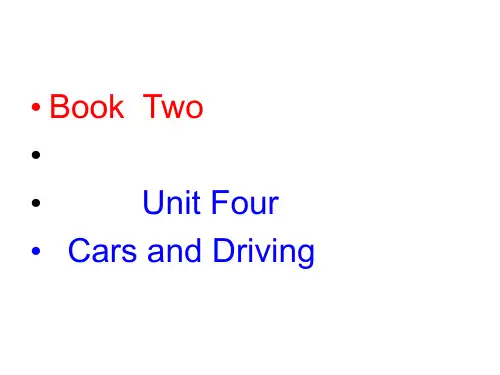
教案任课班级制药111/112 2012年4月1日星期日(补周二)任课班级微生物111 2012年3月29日星期四教师姓名赵东平任课班级化工111/112 2012年3月28日星期三课题名称(教材章节)Unit Four AdvertisingNew words and Expressions & Speaking教学目的和要求 1. Help Ss learn the new words and expressions in this part.2. Remember some useful words and sentences about environment. Such as: agent, consumer, contain, convey, display, symbol, …教学重点 1.New words and expressions in this part教学难点 1. Explain and understand the meaning of new words and expressions教学过程与主要内容Step I Field work.Step II Read the new words and expressions and explain the key words and expressions.Step III Speaking part Task 1: Talk about the 4 images on P50Task2: Use the following sentence patterns and the words or phrases from Task 1 to talk about the pictures on Page 50 . A. Of all…, I like…best. B. The reason is that …Task 3: Work in pairs. Take turns asking your partner the following questions and make notes.What types of advertrisements do you often see or hear?What do you feel about TV advertisements that cut your favorite movie into pieces? How do you view the relationship between advertising and your life?Step IV Give Ss assignment today课外作业Homework Oral PracticePractice the new words and expressions阅读参考书目Hope English Book II Teacher’s Reference BookInternet resource课后体会教案任课班级制药111/112 2012年4月1日星期日(补周二)任课班级微生物111 2012年4月5日星期四教师姓名赵东平任课班级化工111/112 2012年3月29日星期三课题名称(教材章节)Unit Four AdvertisingReading A教学目的和要求Read and understand the meaning of Reading A.Master the sentence patterns from the Reading AFinish the exercises of Reading A教学重点Sentence pattern from Reading AExercises after Reading A教学难点Explanation of Reading A and exercises教学过程与主要内容Step I Revision Word dictationStep II. Reading A: Advertising Task 1: Give brief answers to the following questions. Then ask your partner about his/her answers and take notes.Task 2: Detailed Reading The teacher explain the language points in the text. Task 3: Ss can scan a passage to get specific ideas.Step III Do some after-reading exercises.Step IV Assignments课外作业Review and RememberPreview the grammar and listening part阅读参考书目Hope English Book II Teacher’s Reference BookListen to this Step by step课后体会教案任课班级制药111/112 2012年4月10日星期二任课班级微生物111 2012年4月 6日星期五教师姓名赵东平任课班级化工111/112 2012年4月 5日星期四课题名称(教材章节)Unit Four AdvertisingGrammar and Listening and Reading B教学目的和要求Know the special usage of subjunctive moodKnow the skills of listening教学重点 1. Help the Ss understand the listening materials in details.教学难点Explanation for reading materials in details教学过程与主要内容Step I .Revision 1.Ask some questions on Reading A.2.Ask the students to translate some sentences into English.Step II. Introduce the grammar: subjunctive moodDo Task 1 –Task 3 together and explainStep III. Listening.Do Task 1 –Task 6 together and explainStep IV. Explain Reading B.Step IV. HomeworkStudents’ Learning Card课外作业Homework Students’ Learning Card: ListeningReview the listening skills and preview .Reading C and Writing part阅读参考书目Hope English Book II Teacher’s Re ference BookInternet resource课后体会教案任课班级制药111/112 2012年4月10日星期二任课班级微生物111 2012年5月2 日星期三教师姓名赵东平任课班级化工111/112 2012年4月11日星期三课题名称(教材章节)Unit Four AdvertisingReading C and Writing and Presentation教学目的和要求Train the fast reading ability.Know the skill of writing a letter of thanks.教学重点 1. Help the Ss do the exercise.教学难点Explain the reading and writing materials in details.教学过程与主要内容Step I. Revision Translate some sentences into English. Step II. Reading CAllow 10 minutes for Ss to do the task, and then teacher checks the answer.Step III. Writing for General Purposes: Writing for general purposes—Task: development by exampleWriting for specific purpose—Task: letter of thanksStep IV. PresentationAsk each group gives a presentation in front of the class.Step V: Homework课外作业Presentation PartReview and preview.阅读参考书目Hope English Book II Teacher’s Reference BookInternet resource课后体会。
全新版大学英语综合教程第二版第4册课后习题答案-U4第四课 In search of Davos manWilliam F. Browder was born in Princeton, New Jersey, grew up in Chicago, and studied at Stanford University in California. But don't call him an American. For the past 16 of his 40 years he has lived outside the U.S., first in London and then, from 1996, in Moscow, where he runs his own investment firm, Hermitage Capital Management. Browder now manages $1.6 billion in assets and has made a name for himself(成名) locally by campaigning against(展开反对的活动)opaque and corrupt business practices (不透明的,腐败的商业行为)at Russian companies. In 1998 he gave up his American passport to become a British citizen, since his life is now centered(集中) in Europe. "National identity(国家认同) makes no difference for me," he says. "I feel completely international. If you have four good friends and you like what you are doing, it doesn't matter where you are. That's globalization."Alex J. Mandl is also a fervent believer in globalization, but he views himself very differently. A veteran(经验丰富的)telecommunications executive(经理) and former president(前任主席) of AT&T, Mandl, 61, was born in Austria and now runs a French technology company called Gemplus International, which is doing more and more business in China.He reckons(估计)he spends about 90% of his time traveling on business. But despite all that(尽管如此)globetrotting, Mandl who has been a U.S. citizen for 45 years still identifies(识别)himself as an American. "I see myself asAmerican without any hesitation(犹豫). The fact that I spend a lot of time in other places doesn't change that," he says.Although Browder and Mandl define(定义)their nationality differently, both see their identity as a matter of personal choice, not an accident(意外)of birth. And not incidentally(偶然), both are Davos Men members of the international business élite(杰出人物)who trek(艰苦跋涉)each year to the Swiss Alpine(阿尔卑斯山) town for the annual meeting of the World Economic Forum (WEF), founded in 1971. This week, Browder and Mandl will join more than 2,200 executives(高管们), politicians, academics(学者), journalists(新闻记者), writers and a handful of(少数)Hollywood stars for five days of networking(交流), parties and endless earnest(认真的) discussions about everything from postelection Iraq(选后伊拉克) and HIV in Africa(艾滋病在非洲) to the global supply (供给) of oil and the implications of nanotechnology(纳米技术的含义). Yet this year, perhaps more than ever, a hot topic at Davos is Davos itself. Whatever their considerable differences, most Davos Men and Women share at least one belief: that globalization the unimpeded(畅通无阻的) flows of capital(资本流动), labor(劳动力)and technology across national borders(边界) is both welcome and unstoppable. They see the world increasingly as one vast(广阔的), interconnected(连同的)marketplace(市场) in which corporations search for the most advantageous locations to buy, produce and sell their goods and services.As borders(边界)and national identities(国家身份)become less important, some find that threatening(威胁) and even dangerous. In an essay(散文)last year in The National Interest (国家利益)entitled "Dead Souls: The Denationalization of the American Elite(非国有化的美国精英)," Harvard Professor Samuel P. Huntington described Davos Man (a phrase that first got widespread(普遍的) attention in the 1990s) as an emerging global super species(一个全球新兴的超级物种) and a threat(威胁). The members of this class, he wrote, are people who "have little need for national loyalty(忠诚), view national boundaries (看待国家边界)as obstacles(障碍)that thankfully are vanishing(消失), and see national governments as residues(剩余物) from the past whose only useful function is to facilitate (促进)élit e's (精英的) global operations(运作)." Huntington argues that Davos Man's global-citizen self-image(全球公民的个人形象) is starkly(明显的) at odds with(与不和) the values of most Americans, who remain(剩余) deeply committed(忠诚)to their nation. This disconnect(分离), he says, creates "a major cultural fault(断层线)line In a variety of ways, the American establishment(确立), governmental(政府的) and private, has become increasingly divorced(分离)from the American people."Naturally, many Davos Men don't accept Huntington's terms. "Huntington forgets that there is a difference between culture on the one hand, and attitudes and lifestyle on the other," contends(竞争) Klaus Schwab, the founder(创始人)and executive chairman of the World Economic Forum, arguing that endorsing(签署)a global outlook(展望)does not mean erasing(清除)national identity. "Globalization can never provide us with cultural identity, which needs to be local andnational in nature."(7段缺部分)No wonder so many Western workers worry about losing their jobs. "If the issue(问题) is the size of the total pie, globalization has proved(证明)a good thing," says Orit Gadiesh, chairman of consultants(顾问) Bain & Co. "If the issue is how the pie is divided, if you're in the Western world you could question that."8 The biggest shift(移动) may just be starting. A landmark (陆标)2003 study by Goldman Sachs predicted(预计)that four economies — Russia, Brazil, India and China — will become a much larger force in the world economy than widely expected, based on projections(预测)of demographic(人口)and economic growth, with China potentially(可能的)overtaking(赶上)Germany this decade. By 2050, Goldman Sachs suggested, these four newcomers will likely have displaced(取代)all but the U.S. and Japan from the top six economies in the world. Few economists would argue that such predictions are a reason to put the brakes(刹车)on globalization —even if that were possible. But it's no longer disgraceful(可耻的)in the academy(研究院)to argue that globalization threatens(威胁)to take a toll(征税)on advanced economies.It's also entirely possible that the near future may see the pendulum(摇摆) of capital(首都)swing away from(背离)Davos Man-style globalization. One counterpoint(对应物)is Manila(马尼拉)Woman —low-paid migrant(移民的)workers from Asia and elsewhere who are increasingly providing(以为条件) key services around the world. Valerie Gooding, the chief executive of British health care company BUPA, says the British and U.S. health care system would break down without immigrant(移民的) nurses from the Philippines, India, Nigeria (尼日利亚)and elsewhere. While BUPA employs about 300 people in India to handle its outsourced(外包的) information technology needs(信息技术需要), about 10% of the nurses and health care assistants(健康保健助理) in its nursing homes and hospitals are from overseas — and, unlike Davos Man, she says, they're not ambivalent(矛盾)about being strongly patriotic (爱国的).Not all Davos Men seek global markets, either. Patrick Sayer runs a private equity firm(股份公司) in France called Eurazeo, and complains(抱怨) there are still too many barriers(障碍)to cross-border business in Europe, let alone(更不必说)the world. So he's focused(注视) Eurazeo on its domestic market. "I profit(得益于) from being French in France. It's easier for me to do deals," Sayer says. "It's the same elsewhere. If you're not Italian in Italy, you won't succeed."That may sound like a narrow(狭窄的) nationalism(民族主义者), yet it contains(包含) a hidden wisdom. Recall(回忆)that Italy itself was, until 1861, not a unified(统一的) nation but an aggregation(集合体)of city-states. Despite(尽管) tension (使紧张) between its north and south, there's no contradiction (矛盾) between maintaining(维持) a regional identity and a national one. Marco Tronchetti Provera, chairman of Telecom(电信) Italia, for example, can feel both Milanese and Italian at once, even as he runs a company that is aspiring(立志) to become abigger international presence(存在). The question is whether it will take another 140 years for Davos Man to figure out(解决)how to strike(打击) the same balance on a global scale.。